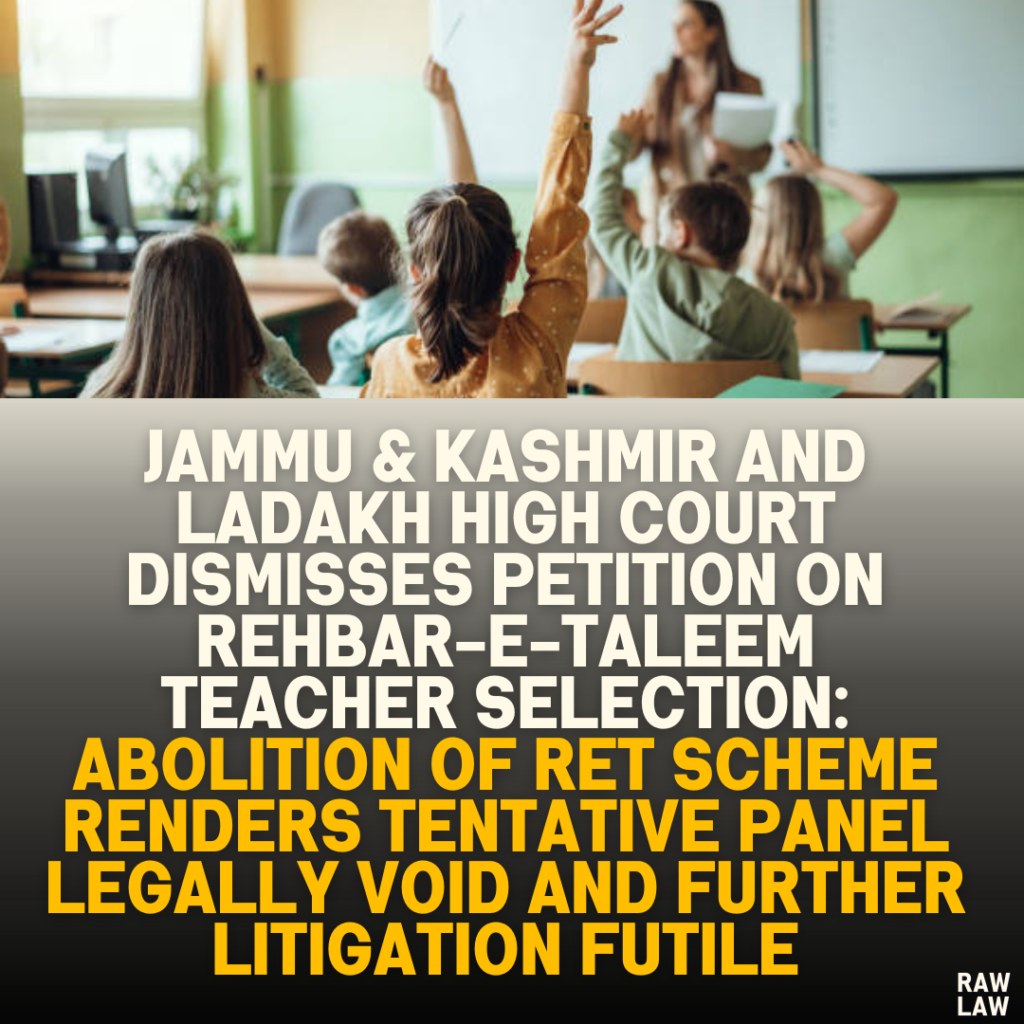Court’s Decision
The High Court of Jammu & Kashmir and Ladakh dismissed the writ petition concerning the selection process of Rehbar-e-Taleem (ReT) teachers at the Government Middle School, Shistergam. The court ruled that the petition had become infructuous following the abolition of the ReT Scheme through Government Order No. 919-Edu of 2018. The tentative selection panel under contention was neither finalized nor protected under legal precedents. Consequently, further examination of the petition and the impugned order was deemed unnecessary.
Facts
- Advertisement and Application:
- In May 2013, the Zonal Education Officer, Qazigund, advertised two ReT posts for the Government Middle School, Shistergam.
- The petitioner, meeting the specified qualifications of a science and mathematics background, applied for the post.
- Selection Process:
- A tentative selection panel was prepared in June 2013, placing the petitioner second.
- Objections were invited regarding the panel’s validity.
- Challenge to Selection:
- Certain candidates (Respondent Nos. 8 and 9) challenged the selection panel, claiming residency in the eligible habitation area.
- An inquiry conducted by the Deputy Commissioner, Anantnag, declared these respondents as residents of Shistergam, leading to further disputes.
- Subsequent Developments:
- The ReT Scheme was abolished in 2018, and all fresh appointments under it were prohibited.
- The tentative panel in this case had not been finalized or approved when the scheme was terminated.
Issues
- Did the abolition of the ReT Scheme render the writ petition moot?
- Was the tentative selection panel eligible for protection under legal precedents safeguarding approved panels?
Petitioner’s Arguments
- The petitioner alleged bias in the Deputy Commissioner’s inquiry, asserting that Respondent Nos. 8 and 9 were not bona fide residents of Shistergam.
- The petitioner argued that the respondents had applied after the deadline and no longer had an interest in the posts.
- It was contended that the Deputy Commissioner’s decision ignored reports from earlier inquiries, which disqualified the respondents based on their residency.
Respondents’ Arguments
- Government Respondents:
- The scheme’s abolition rendered the petition moot, as no further appointments could be made under the ReT framework.
- The tentative panel was still subject to objections and lacked final approval, excluding it from legal protection.
- Private Respondents (Nos. 8 and 9):
- They supported the findings of the Deputy Commissioner, confirming their residency in Shistergam.
- They argued that the petitioner lacked standing to challenge the findings after the abolition of the scheme.
Analysis of the Law
- Government Order No. 919-Edu of 2018:
- This order prohibited further appointments under the ReT Scheme and invalidated pending selection processes that were not finalized.
- It explicitly allowed previously finalized panels to remain unaffected.
- Judicial Precedents:
- The Division Bench’s decision in Rukhsana Jabeen v. State of J&K and Ors. clarified the impact of the government order:
- Approved panels with formal engagement orders remained valid.
- Pending disputes over tentative panels were dismissed since further appointments were legally barred.
- The Division Bench’s decision in Rukhsana Jabeen v. State of J&K and Ors. clarified the impact of the government order:
Precedent Analysis
In Rukhsana Jabeen, the court outlined the following key principles:
- Panels that were finalized and acted upon before the scheme’s abolition retained validity.
- Courts could not direct authorities to finalize tentative panels after the scheme’s closure.
- Panels subject to unresolved objections or litigation were rendered void.
Applying these principles, the court in this case determined that the petitioner’s tentative panel did not qualify for protection, as it was still subject to objections and lacked approval.
Court’s Reasoning
- Tentative Nature of the Panel:
- The panel was incomplete and had not undergone final approval by the Chief Education Officer.
- Legal protections extended to finalized panels did not apply to the petitioner’s case.
- Abolition of the ReT Scheme:
- The scheme’s termination rendered all pending and tentative processes legally void.
- Continuing the litigation would serve no purpose as appointments under the scheme were no longer permitted.
- Impact of Precedents:
- Judicial precedents emphasized the impossibility of directing authorities to act on tentative panels post-abolition.
- The court adhered to the principles established in Rukhsana Jabeen.
Conclusion
The court dismissed the writ petition as infructuous. It reasoned that:
- The tentative panel under dispute could not be acted upon due to the scheme’s abolition.
- Pursuing the matter further would be a “futile exercise” given the clear legal framework established by the government order and judicial precedents.
Implications
This judgment reinforces that:
- Policy changes, such as the abolition of schemes, can nullify ongoing disputes and processes tied to those frameworks.
- Tentative or incomplete processes that lack final approval are particularly vulnerable to becoming void in such scenarios.
- Courts are bound by precedents and cannot entertain claims that contravene overarching policy decisions.




Pingback: Bombay High Court Quashes Trial Court Orders on Restoration Application, Cites Procedural Lapses, Lack of Evidence for Delay Justification, and Emphasizes: "The Court Has to Administer the Law and Ensure Evenness and Impartiality" - Raw Law